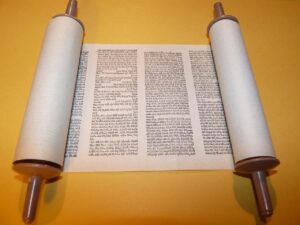
In part one of this three-part series, we looked at the first two Servant Songs in the book of Isaiah. All four songs describe Jesus’ divine nature, His first advent (birth, ministry, death, and resurrection), His forthcoming second advent during the Tribulation, and how it all fulfills Old Testament prophecy. Isaiah 42:1-9 and 49:1-13 present the first two Servant Songs. Now, we turn to chapters 50 and 52 for the third song and the first half of the fourth song. We will finish the fourth song in part three.
[Missed the First Two Songs? Click Here for Part One of Discovering Isaiah’s 4 Messianic Servant Songs]
Isaiah’s Third Servant Song
Isaiah 50:4-11 contains the third Servant Song. It is Jesus’ narrative about the Father perfecting Him through obedience. Isaiah divides the song into four sections—verses 4, 5-6, 7, 9—all beginning with the words, “The LORD GOD.” It opens in verse 4 (section one) with Jesus acknowledging His exceptional power to encourage others.
“The LORD GOD has given Me the tongue of the learned that I should know how to speak a word in season to him who is weary.” (v4)
Here, the Father has given His Son, Jesus the Servant, the power to listen as a disciple so that He may comfort those in need. We repeatedly see this ability throughout the gospel narratives.
Section Two. Verses 5-6 contain the second part of the third Servant Song, where Jesus affirms His obedience and unwavering loyalty to the Father’s will.
“The LORD GOD has opened My ear, and I was not rebellious, nor did I turn away. I gave My back to those who struck Me and My cheeks to those who plucked out the beard. I did not hide My face from shame and spitting.”
Some scholars say verses 5-6 refer to Israel, presumably because verses 1-3 were about Israel. But remember, the perspective pivoted to Jesus in verse 4. We know this because here, in verse 5, it says, “I was not rebellious.” Nowhere do the Scriptures say Israel was not rebellious, except in Psalm 105:28, but that verse refers to Israel before the exodus. Every other time, the Bible describes Israel as rebellious.
With this, we know Isaiah 50:5 is talking about Jesus, who never rebelled but was obedient unto death.
Sections 3 and 4
The third section of the third Servant Song begins in Isaiah 50:7, where Jesus declares His confidence in the Father’s mercy and His defense against the hands of His unrelenting accusers, the religious leaders. Yet despite the persecution, verse 7 here tells us of His determination to be crucified.
“I have set My face like a flint.”
Jesus knows He will suffer to bring the gospel to the people. However, He knows the Father will keep Him from shame. With this confidence, Jesus invites an unnamed adversary to come near.
The sinless Servant’s confidence carries over into verse 9, the fourth section, where He declares He will be victorious. He knows those guilty of condemning Him will be like an old garment devoured by moths, and they will all stand in judgment before Him one day (Revelation 20:11-15).
The third song finishes with a call for Israel to repent in verse 10.
“Who among you fears the LORD? Who obeys the voice of His Servant? Who walks in darkness and has no light? Let him trust in the name of the LORD and rely upon his God.”
Walking in darkness likely refers to the nation’s difficulties of the time; however, the spiritual heart of the message remains timeless. Though people tend to walk in the light sparked by their own fire, the Servant implores us to seek the light of the Lord alone. The consequences are clear if we do not.
“This you shall have from My hand: You shall lie down in torment.” (v11)
Though many reject His efforts to save them, Jesus is unfailingly faithful to the Father, who grants Him power to defeat any enemy. Through that same power, Jesus offers us grace, an opportunity to lean on Him and trust Him in every area of our lives. Those who listen to the Servant will not “lie down in torment” but enjoy eternal life and freedom.

The Fourth Servant Song
Many theologians consider the fourth and last Servant Song the most extraordinary of them all. This portion of Isaiah (the first twelve verses) is where we learn God is unarguably the author of the Scriptures, and Jesus is the fulfillment of all messianic prophecy. Compared with other biblical accounts written hundreds of years apart, this song makes it clear no human could have written such detail merely by coincidence.
Here, we will focus on the song’s first half, beginning in Isaiah 52:13-15 with Jesus’ future exaltation and humiliation at the cross.
“13Behold, My Servant shall deal prudently. He shall be exalted and extolled and be very high. 14Just as many were astonished at you, so His visage was marred more than any man and His form more than the sons of men.”
To “deal prudently” in verse 13 translates as “will prosper” or “act wisely,” i.e., the Servant will handle His actions with divine wisdom. The song goes on to say He will be “exalted and extolled and be very high,” which translates as “high and lifted up,” the same wording as in Isaiah 6:1.
“In the year that King Uzziah died, I saw the Lord sitting on a throne, high and lifted up, and the train of His robe filled the temple.”
Isaiah 6:1 refers to the Father, but the prophet repeats it here in 52:14 concerning the Servant. In doing so, he acknowledges that Jesus is on the same level as the Father, as they are both a part of the Godhead (trinity of God, see Genesis 1:26; 3:22).

Jesus’ Brutal Suffering
“Just as many were astonished at you, so His visage was marred more than any man. And His form more than the sons of men.” (Isaiah 52:14)
Isaiah then prophesies in verse 14 that Jesus must physically suffer to the point of unrecognition because of our sin. But a notable curiosity is, who is the one astonished? Some scholars think the word refers to Israel, which may be true since “you” is spelled in lower case, whereas the Bible almost always refers to the Lord with upper case letters (e.g., LORD GOD, My, He, His, etc.). But other scholars assert it appears that the Father is speaking directly to the Servant, which is why both the NIV and NLT translations use the word “Him” instead of “you.” Needless to say, it is up for debate.
Nevertheless, the greater point of verse 14 is the suffering the Servant will endure for our sins. The New Testament gospels clearly describe its fulfillment and how the people were genuinely astonished due to the severity of His injuries. Yet He persisted in going to the cross.
In finishing Isaiah 52, verse 15 tells us how Jesus cleansed Israel and all nations of their sins through His atoning death (“sprinkle many nations”). “Sprinkle” is a reminder of Leviticus (4:7-8, 8:11, 14:7, 16:14, 19) and Numbers (8:7, 19:18-19), where the priest sprinkled the blood of a lamb, bull, or goat on the mercy seat in the Temple in atonement for Israel’s sin.
Verse 15 also foretells how everyone shall finally see the truth of who Jesus is when He rules over His millennial kingdom after the Tribulation (Revelation 21). They will recognize Him in a way far different from any before.
At that time, every leader of every nation will see and experience the fullness of Jesus’ glory and power, and they will be speechless. They will “shut their mouths at Him” in reverence and submission. Indeed, every person alive will be equally flabbergasted and humbled.
Jesus the Servant possessed supernatural loyalty and confidence in the Father. Nothing could deter Him from His established plan of redemption. Next time, in the last and final part of this series, we will explore the second half of the fourth song, how greatly Jesus suffered for our sins, His humiliation, and His ultimate victory and exaltation.
“He has appeared to put away sin by the sacrifice of Himself.” (Hebrews 9:26)
Click Here to Continue to Part Three: Servant Song 4
Miss Part One? Click Here for Servant Songs 1 and 2
